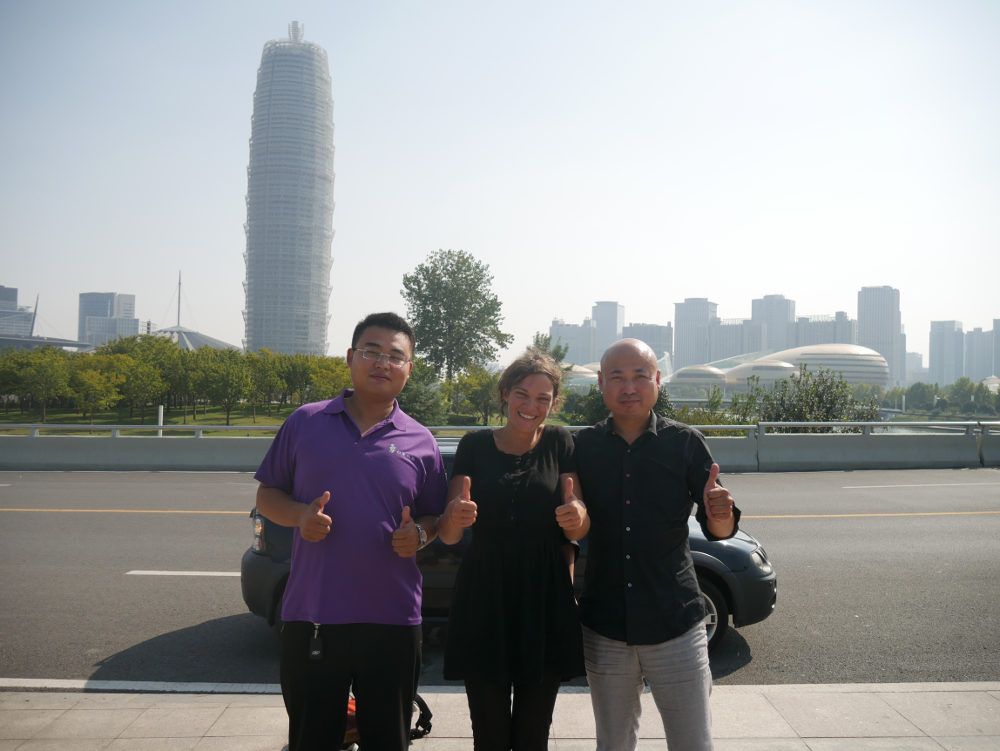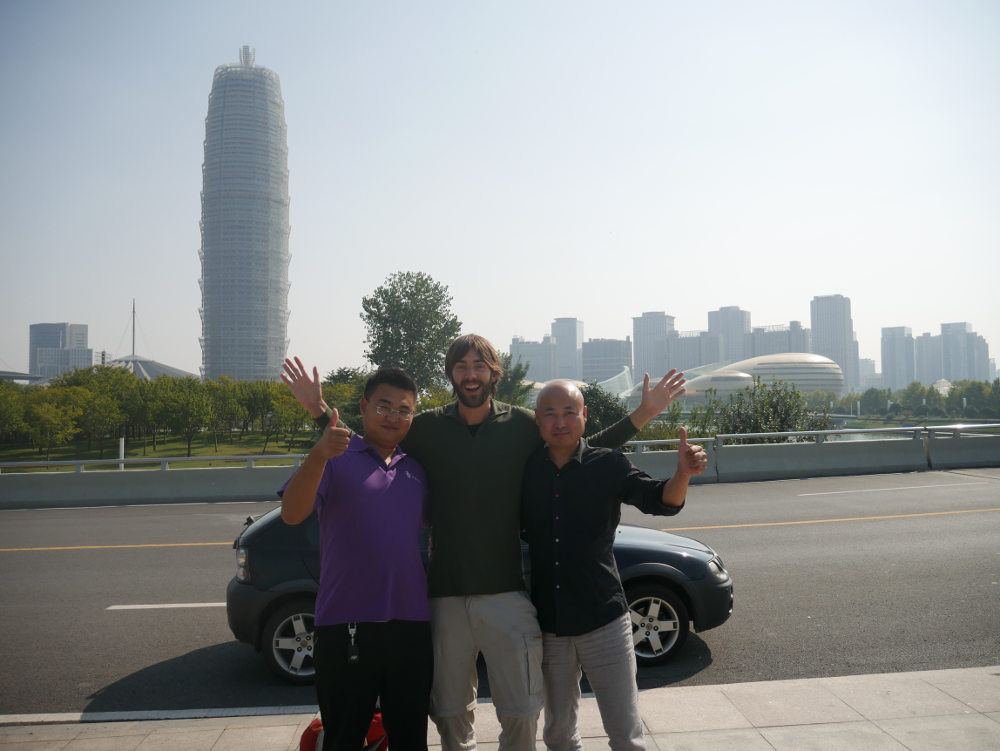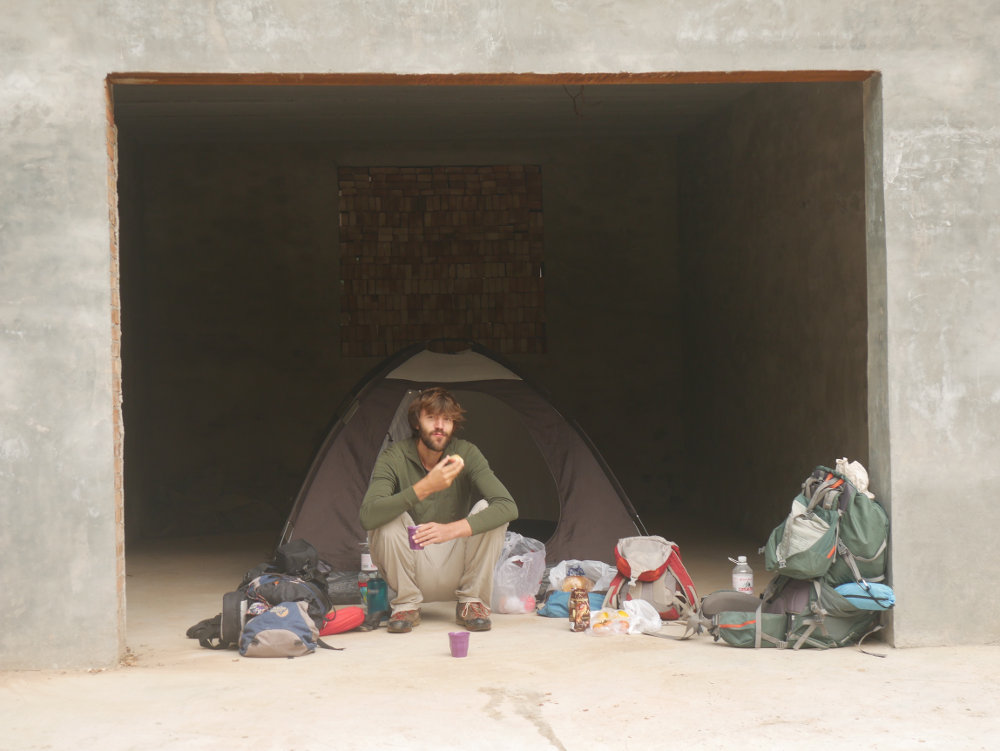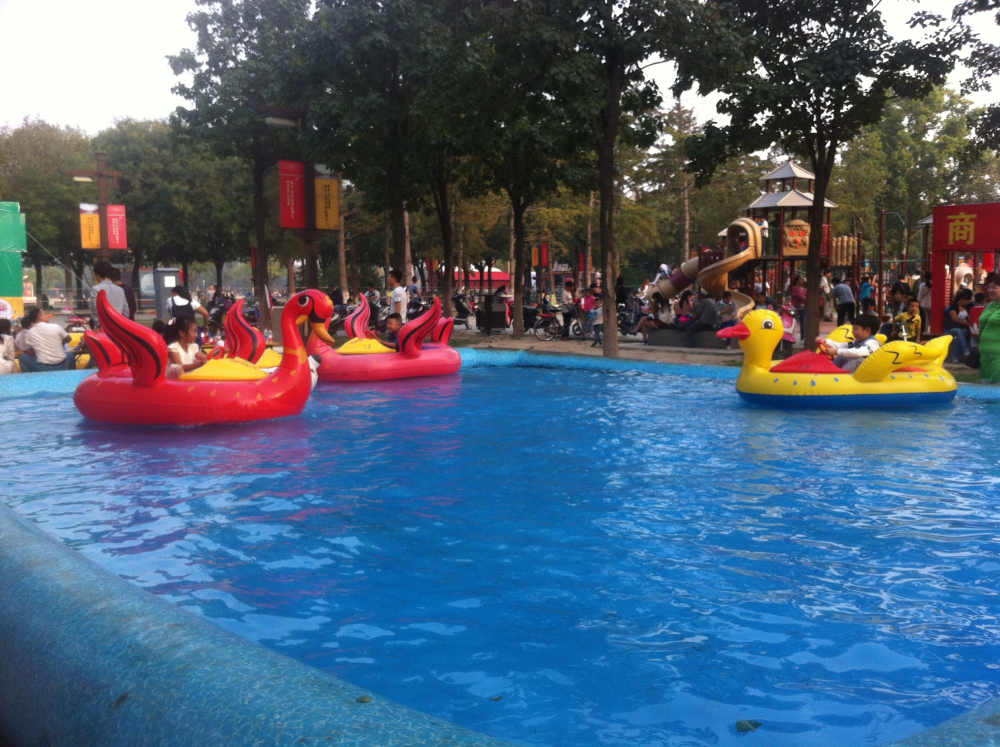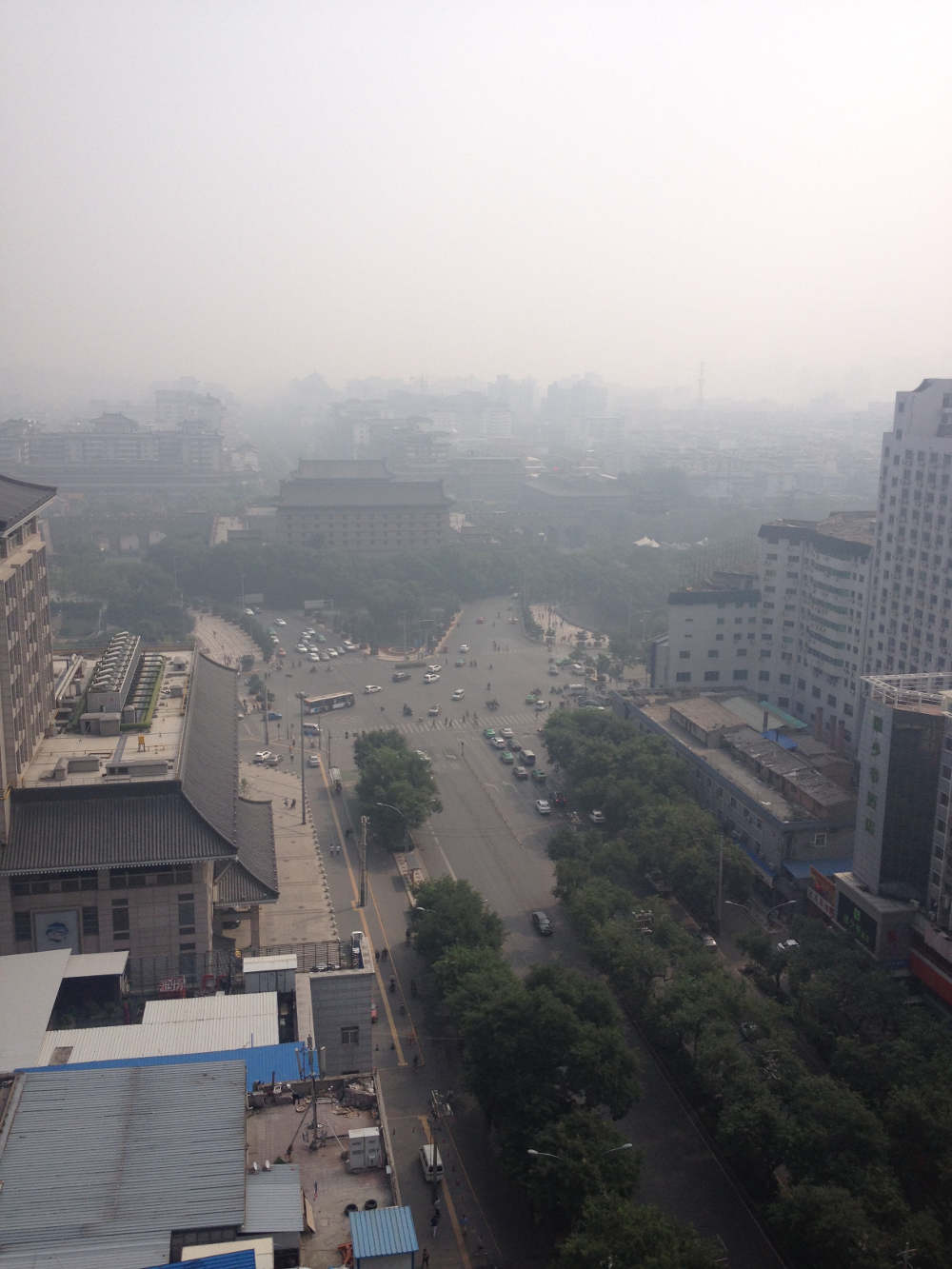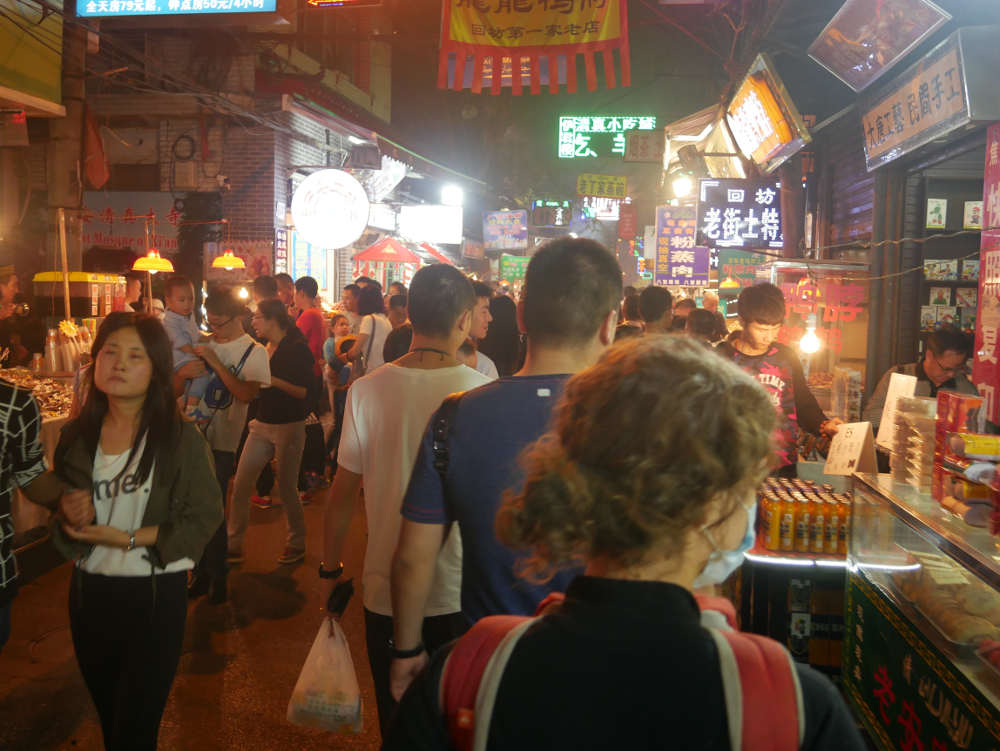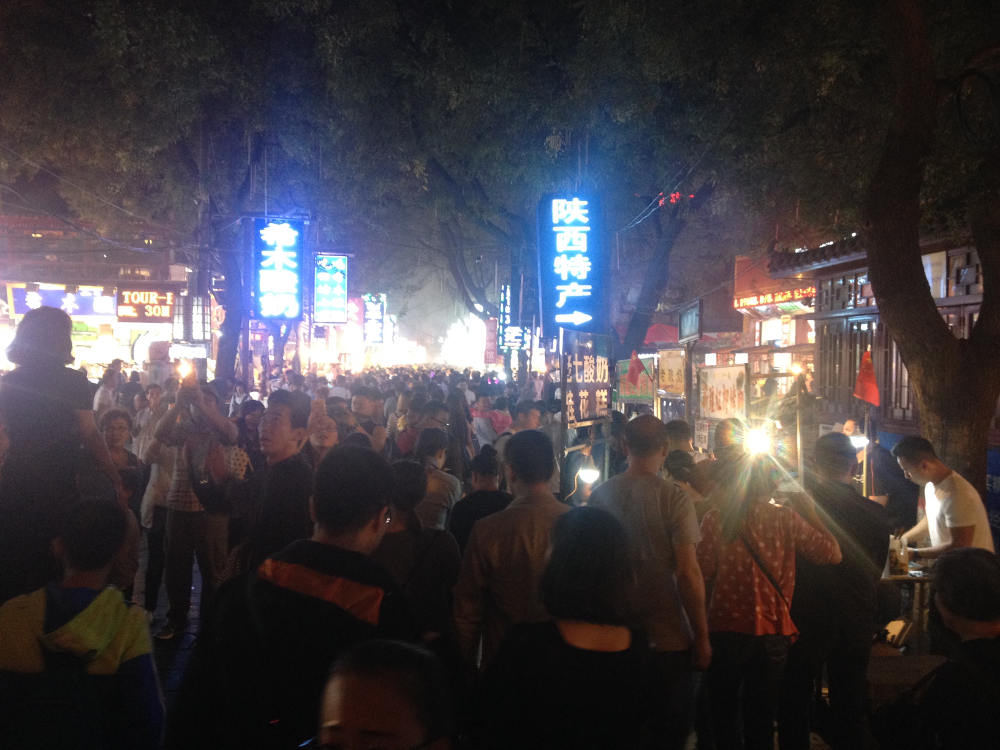China, October 2016
After we said our goodbyes to Sisi and Huiwen, thanking them for their incredible hospitality and their help in getting our visa for Pakistan, we were waving down cars outside of Jiaozhou on a highway exit towards Rizhao. It didn’t take long for a tow truck to stop just far enough behind us in the bend, smack down in the middle of the road in a blind spot to any cars racing up from behind. As we were anxiously running towards the truck, as fast as our backpacks would allow us, we found the Chinese driver staring at us with a dumbfounded look on his face, oblivious of his impossible parking spot, curiously but ever so friendly looking us up and down. While we were frantically gesticulating our intentions, hoping to put a quick end to our rather dangerous collective predicament, the driver leisurely asked us in the most polite and care free way what it was he could help us with. At least so we thought, as our Mandarin was still ever as non-existent as his English. All we could think was: “yep, we’re still definitely in China”.
By now, the first cars had been stacking up behind the truck. Luckily the drivers had been quick enough to find their brakes in time. To our astonishment, they were all waiting patiently while the three of us were chatting away on the national highway. It felt like ages before the driver waved us in, but the whole thing lasted probably less than a minute. By now, we had gotten pretty good at explaining where we wanted to go. We’d start with: “wǒmen” (we), while pointing at us, followed by the name of the next biggest city we would be traveling towards, while pointing at our map. We would often repeat it a few times, because our intonations are always way off (vowels have four different intonations in Mandarin, potentially giving the same word four very different meanings). Then we would ask: “nǐ” (you), while pointing at the driver. Our driver nicked and smiled, indicating he understood we wanted to go south and that he could take us there. Ten minutes later, we exited the highway going northwest…
Our driver was quick enough to reassure us though, waving his arm in a circular way to let us know he would be coming back to the same point. It turned out he needed to tow a small truck that stalled on the highway, unfortunately not quite small enough to fit onto his tow truck. So after a lot of hemming, hawing and hammering, but not a lot of lifting or driving, darkness set in. Tired from a day’s worth of passport chasing in Jiaozhou, we decided to take our chances and wait it out. Eventually our driver threw in the towel, left the broken-down truck behind, and drove us back to the highway going south. The driver let us out in an equally dangerous spot as where he let us in, only this time in the pitch dark night.
We thanked our Chinese friend and quickly jumped the guardrail. Plowing our way through the bushes up a steepish small climb, we slipped through what (as we learned the next morning) was the only hole in a long metal fence, to pitch our tent on top of the hill.
We hadn’t gotten very far that day, but we were up nice and early the next morning with a full new day of hitchhiking ahead of us. We made our way back down to the highway and did our best to find the safest possible spot to stop cars, which is of course an impossible thing to do on a highway. We decided that this kind of hitchhiking is too dangerous and that from hereon we would stop entering or exiting cars on the actual highway. Luckily for us, we safely found our way into the car of a middle aged couple and as we did our “wǒmen Rizhao”…”nǐ?” thing, followed by their nick and a smile, we figured we were off to a good start. Unfortunately, it didn’t take long for us to exit the highway and make our way back to Qingdao, the place we started two days before. As we kept repeating “Rizhao” and pointing at our map, they kept nicking and smiling, but they also kept driving in the wrong direction. The woman then handed us her phone, with a friend or relative on the line who spoke some English. It turned out the couple wanted to drive us to the bus station, to find a bus to Rizhao. A wonderful gesture, but not what we were after. At this point we wholeheartedly thanked our escorts, yet convinced them to let us out nonetheless. By now we were in an outer suburb of Qingdao, too far from the highway to walk back. So we simply hopped in the first bus that went in the right direction and somehow managed to explain ourselves. From where we left the bus, we started walking and waving down cars, to which the most extraordinary couple stopped. They were about our age, she looked and played the part a real-life mannequin, while he was a flamboyant character with a knack for dramatic facial expressions. They drove us to their barbershop, where we yet again got lost in translation, though eventually they dropped us off at the entrance of the highway to Rizhao.
From here we decided to stick to our plan to stay safe. It required some more walking on our part, but as soon as we made it around the bend at Rizhao, west to Qufu, we managed to stick with highway service areas. We had some amazing drivers who went to great lengths to find us a new ride, driving into different service areas and asking around for us whether anyone could take us further west. It became obvious we had left the tourist hotspots, because at these service areas we were continuously being stared at. We were even offered a free lunch in one of these places, just for being foreign. So when it got dark, we figured it would be best to pitch our tent far enough out of sight to not be noticed. We realized a little too late that we had pitched our tent down-wind from a rather fragrant outside toilet building, but were too tired to crawl back out of our sleeping bags to move our tent.
We slept great regardless and were in luck the following morning, because we met the two friendliest guys, Leiluo and Shandong, who took us all the way out of Qufa into Zhengzhou where they even took us out to lunch for some of the most amazing Chinese food. They proceeded to tour us around this mega city, which looked like it had only recently been stamped out of the ground. There were new high rises everywhere, with half-empty eight to ten lane streets cutting across. Then Leiluo took us all the way out of the city, back on the highway to Xi’an, to drop us at a service area from where we hitched our way to Sanmenxia. As it had gotten already dark again, we started exploring the area around the highway exit for a good camping spot and found our way to a dark road under a flyover, where we heard loud music coming towards us. Half-worried about local youngsters (gangsters?) hanging around in the shadows we moved forward, into a brightly lit schoolyard where the only “youngsters” we could see were the middle-aged women of the village dancing to the loud music we had heard before. Relieved, we continued to look for a place to camp, when al of a sudden a little girl came up to us, asking us where we were from. She had learnt a few phrases of English in school and followed us along our way. When we asked her for her help, she quickly ran off to get her mother who pointed us at a vacant garage next to their house. They brought us a small candle so we would have some light and tried to communicate with us with a translator app on their phone, which unfortunately didn’t work that well. The only thing we could understand was that this place was called “town under the bridge”, which made sense, as the half-built village they had probably stopped building at least 5 years before, considering the overgrown skeletons of cement and steel, was mostly located underneath a rather noisy railroad-bridge. The next morning our other side neighbor kept popping up. Curious and friendly as he was, he first brought us some hot water (the health-staple of every Chinese diet), then some kakis, some moon cakes, then he came back with some bread rolls, after which he showed up with a pomegranate. Always smiling, always looking at us curiously in the most friendly way. More people came by to have a look, an attempt at a chat or to bring us food. We figured we were probably the first foreigners they had ever laid their eyes on.
From here we could easily manage it to Xi’an in a few hours. Some of our funniest moments were at yet another service area where we sat down to eat the last of our provisions. Everyone was staring at us again, but we had plenty to look at ourselves as well. On our right, we spotted a Chinese girl in a bus intently looking at us, while grabbing her phone. As soon as she noticed us looking back, she quickly hid behind her window curtain, after which, very slowly, her phone appeared in the window from behind the curtain. We couldn’t help but laugh and friendly waved at her, to accommodate her in snapping our picture. Soon after, on our left, we witnessed a typical custom we have only seen in China so far. It was a father toilet training his kid over a garbage can, peeing down through a hole in his pants. In China, small kids don’t wear diapers. They have regular pants with a hole in the back and when they need to go, they squat down and go, no matter whether they are on the street, inside a supermarket, or in this case, hovering in mid-air over a garbage can.
Two rides later, we made it to Xi’an, the former capital of many ancient dynasties and one of the oldest cities in China. Here we met up with policeman and communist party member Kai through Couchsurfing. Kai showed us around and shared some great stories about the police in China. One of which was that the police in China carry nothing but their nightstick. When in need of a gun, “they would first have to find the keys to the cabinet where the guns are locked up, after which they would have to find the keys to open up the cabinet where the bullets are stored”. Perhaps they don’t need guns due to the high morale of their law-abiding citizens, it might also have something to do with the potential terror you face form the communist party when you get arrested. As it happened, Kai was a party member and was adamant in defending his party and all of Marx’ ideologies present in it. We forgave him for not being able to name any one of them.
Xi’an provided us with a deep-dive in its crazily chaotic street food courts (see our Chinese Food video) and gave us our first real taste of the infamous Chinese air pollution. It also formed our starting point on the ancient Silk Road we were to follow in our journey going further west. A road we decided to take by train…
